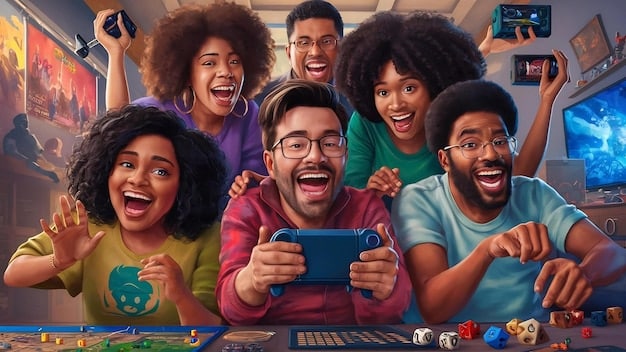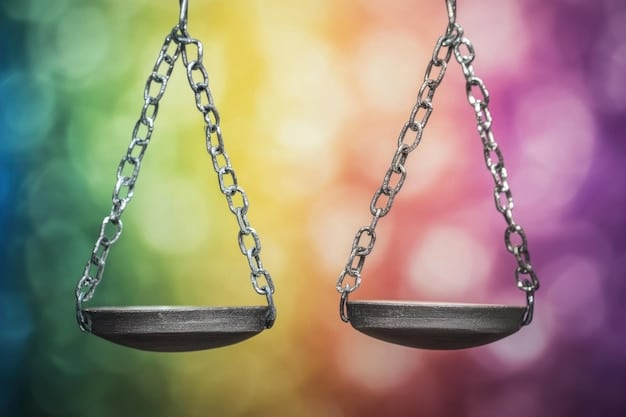Copyright Law Changes in 2025: Impact on Indie Game Developers

Proposed changes to US copyright law in 2025 could significantly impact indie game developers, affecting how they protect, monetize, and navigate the legal landscape of their creative work.
The world of indie game development is dynamic, and the legal framework surrounding it is constantly evolving. As we look ahead to 2025, proposed changes to US copyright law could have significant implications for how will the proposed changes to US copyright law affect indie game developers in 2025? Let’s delve into what these changes might entail and how indie developers can prepare.
Understanding Current US Copyright Law
Before diving into proposed changes, it’s crucial to understand the basics of current US copyright law. This foundational knowledge will help indie game developers better grasp the potential impact of any upcoming revisions.
Copyright law in the United States protects original works of authorship, including literary, dramatic, musical, and certain other intellectual works. This protection is automatically granted the moment a work is fixed in a tangible medium, such as code, art, or music.
Key Elements of Copyright Protection
Understanding the core components of copyright law is essential for indie game developers. These elements define the scope and limitations of their rights.
- Originality: The work must be independently created by the author and possess a minimal degree of creativity.
- Authorship: Copyright protection extends to the creator(s) of the work, granting them specific rights.
- Tangible Medium: The work must be fixed in a physical or digital format that is sufficiently permanent or stable to permit it to be perceived, reproduced, or otherwise communicated for a period of more than transitory duration.
Key Rights Granted by Copyright
Copyright law grants several exclusive rights to the copyright holder. These rights enable creators to control how their work is used and distributed.
- Reproduction: The right to make copies of the work.
- Distribution: The right to distribute copies of the work to the public.
- Derivative Works: The right to create new works based on the original.
- Public Performance: The right to perform the work publicly.
- Public Display: The right to display the work publicly.

These rights empower indie developers to protect their games from unauthorized copying, distribution, and modification. Knowing these rights is fundamental for enforcing copyright protections and guarding against infringement.
Overview of Proposed Copyright Law Changes in 2025
Several proposed changes to US copyright law are on the horizon for 2025. These changes aim to address modern challenges brought about by digital technology and the internet, potentially impacting various aspects of indie game development.
The proposed changes cover a range of issues, including the Digital Millennium Copyright Act (DMCA), fair use, and copyright enforcement in the digital age. Understanding these proposed changes is crucial for indie game developers to navigate the evolving legal landscape.
Potential Impacts on Fair Use
One of the critical areas of proposed reform concerns fair use. Fair use allows limited use of copyrighted material without permission from the copyright holder for purposes such as criticism, commentary, news reporting, teaching, scholarship, or research.
Proposed changes may seek to clarify the boundaries of fair use in the context of digital media, particularly concerning transformative uses and the balance between copyright protection and freedom of expression. These clarifications could significantly impact how indie game developers use existing content in their games.
Revisions to the DMCA
The Digital Millennium Copyright Act (DMCA) is another area ripe for reform. The DMCA addresses copyright issues related to digital content, including online service provider liability and anti-circumvention measures.
- Safe Harbor Provisions: Changes may affect the safe harbor provisions that protect online service providers from liability for copyright infringement by their users.
- Anti-Circumvention Rules: Revisions to anti-circumvention rules could impact indie developers who use or modify existing game engines or software.
- Notice and Takedown Procedures: Proposed changes may streamline or modify the notice and takedown procedures used to address copyright infringement online.
These revisions could affect indie developers who rely on online platforms to distribute their games or who use existing software and technology in their development processes.
How These Changes Affect Indie Game Developers
The proposed changes to US copyright law could have far-reaching consequences for indie game developers. From protecting their own creations to navigating the use of existing content, these changes could reshape the indie game development landscape.
Indie developers rely on a mix of original content and licensed materials. Changes to copyright law could affect how they protect their own work and how they use third-party assets.

Impact on Protecting Original Work
For indie developers, copyright is the cornerstone of protecting their original work. Changes to copyright law could affect how easily they can enforce their rights and prevent infringement.
Strengthening copyright enforcement could make it easier for indie developers to take action against unauthorized copying or distribution of their games. Conversely, changes that weaken copyright protections could make it more challenging to safeguard their intellectual property.
Navigating Fair Use and Licensed Content
Indie developers often rely on fair use or licensed content to enhance their games. Proposed changes to copyright law could impact their ability to use these resources.
Clarifications to fair use could provide more certainty about what types of uses are permissible without permission. However, stricter interpretations of fair use could limit the ability of indie developers to incorporate existing content into their games. Additionally, changes to licensing agreements could affect the cost and availability of licensed assets.
Strategies for Indie Developers to Prepare
Given the potential impact of proposed copyright law changes, indie game developers should take proactive steps to prepare. Staying informed, seeking legal advice, and adopting best practices can help them navigate the evolving legal landscape.
Preparation involves understanding the proposed changes, assessing their potential impact, and implementing strategies to mitigate risks and capitalize on opportunities.
Stay Informed and Engaged
The first step in preparing for copyright law changes is to stay informed about the proposed revisions. Regularly monitor legal news, industry publications, and legislative updates.
- Follow Legal News: Keep an eye on legal news outlets and blogs that cover copyright law and intellectual property issues.
- Join Industry Associations: Participate in industry associations and forums where copyright law changes are discussed.
- Attend Webinars and Conferences: Attend webinars and conferences that provide insights into the latest developments in copyright law.
Engaging with legal experts and industry peers can provide valuable insights and help indie developers stay ahead of the curve.
Seek Legal Advice
Consulting with an attorney specializing in copyright law is crucial for indie game developers. Legal counsel can provide personalized advice based on their specific circumstances and help them understand the implications of the proposed changes.
- Copyright Audit: Conduct a copyright audit to assess the existing copyright protections for their games and identify potential vulnerabilities.
- Licensing Review: Review existing licensing agreements to ensure they comply with the proposed changes.
- Enforcement Strategy: Develop an enforcement strategy to protect their copyright and address potential infringement issues.
Legal advice can help indie developers make informed decisions and protect their intellectual property.
Adopt Best Practices for Copyright Protection
Indie developers should adopt best practices for copyright protection to safeguard their original work. These practices include proper documentation, registration, and enforcement.
- Document Creation Process: Keep detailed records of the game development process, including design documents, artwork, code, and music.
- Register Copyright: Register the copyright for their games with the US Copyright Office to establish a public record of their ownership.
- Enforce Copyright: Monitor the internet for unauthorized copies or distribution of their games and take appropriate action to enforce their copyright.
Implementing these best practices can strengthen copyright protections and deter infringement.
The Role of Industry Associations and Advocacy
Industry associations and advocacy groups play a crucial role in shaping copyright law and representing the interests of indie game developers. These organizations can provide valuable resources, support, and advocacy on behalf of their members.
Industry associations can lobby lawmakers, advocate for fair and balanced copyright laws, and provide education and training to indie developers.
How Associations Help Indie Developers
Industry associations offer various services to support indie game developers. These services include legal resources, networking opportunities, and advocacy on copyright issues.
By joining an industry association, indie developers can access legal templates, educational materials, and expert advice on copyright law. Additionally, associations can advocate for policies that protect the interests of indie developers and promote a fair and competitive marketplace.
Advocacy and Lobbying Efforts
Advocacy groups and industry associations engage in lobbying efforts to influence copyright legislation and regulations. They work to ensure that the interests of indie game developers are considered during the policymaking process.
These groups can provide valuable input to lawmakers, participate in public hearings, and mobilize grassroots support for copyright reform. By working together, indie developers can amplify their voice and shape the future of copyright law.
| Key Aspect | Brief Description |
|---|---|
| 📝 Understanding Current Copyright Law | Knowing the basics helps indie developers grasp upcoming changes more effectively. |
| 🛡️ Protecting Original Work | Changes in law may affect how easily developers can enforce their rights. |
| ⚖️ Navigating Fair Use & Licensed Content | Revisions could impact the availability and cost of licensed assets. |
FAQ
What is the potential impact on indie game developers in 2025?
The changes aim to address modern challenges brought about by digital technology and could reshape the landscape for indie game development.
How will industry associations help?
These organizations can provide valuable resources, support, and advocacy on behalf of members, influencing legislation and regulations.
How can indie developers prepare themselves?
Staying informed, seeking legal advice, and adopting best practices can help navigate the evolving legal environment.
What copyright law aspects are likely to change?
Reform concerns fair use and the Digital Millennium Copyright Act (DMCA), which may have far-reaching consequences.